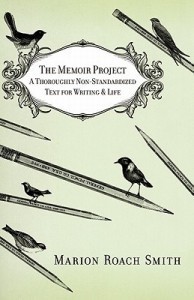Don't Write a Memoir to Get Revenge
The following is excerpted from The Memoir Project: A Thoroughly Non-Standardized Text for Writing & Life by Marion Roach Smith.
It would be impossible to count up just how many people over the years have come into my class hell-bent on writing a revenge tale. So here's some hard-won advice:
Never write a story because you want to exact revenge or betray someone.
Your story can be about revenge, absolutely, but the story itself should not be wielded as a blunt object, a cat-o'-nine-tails, or a bludgeon.
Instead, while writing about the hideous aspects of life, you should attempt to teach us something about the behavior of those involved, about your behavior, about all human behavior. Let us into your story by shedding light on our own dilemmas, fears, happiness, or wide-eyed wonder.
Pretty big requirement, isn't it?
It should be, or else all memoir would be sniveling, and I'm really interested in someone else's sniveling only if it somehow elevates my own. So remember, just like doctors do, "First, do no harm," and don't get suckered into a revenge-to-nowhere tale, where you ask forever how you can get back at someone without ever quite doing so.
Asking the question "What is it about?" will prevent that kind of useless exercise. Ask that, and while the answer might be, "revenge," you will end up writing a piece on how you tried to get some, what you learned along the way, or how you plotted and plotted and where that led you.
Writing a tale that seeks revenge, you'll quickly see that tale as merely a list of hurts, which, when you get to the end of that list, is a list that may not interest even you anymore. Revenge as a topic is good; as an intent, it's not. This is another benefit to writing with intent, instead of writing for exercise.
Not to go all bumper sticker on you, but learn to write with intent and you might learn something about life—as you will when you learn to reduce the essence of the piece to a single totemic emotion such as "pity" or "joy," a single experience such as "freedom" or "redemption," or even a single phrase such as "the dramatic story of a family's struggle with Alzheimer's disease."
That may take some time. But you can do this now: You can decide on a genre—humor, perhaps—and choose how to illustrate it.
Here's how you do it. Say aloud to yourself, "This is a piece of humor, and the illustration is that day at the proctologist," or "This is a tragedy, and the illustration is finding those Polaroids," or "This is about how anger withers the soul, and the illustration is my uncle Henry's struggle for revenge."
What will not work is the phrase "This is a tragedy and the illustration is my marriage." This is too big. On the enormous topic of your marriage, look instead for the moment it shifted—the discovery of the Polaroids that revealed where it is your spouse would rather be; the first time your wife didn't get choked up at someone else's wedding; alone, trying to snap the safety clasp of your bracelet after the death of your partner—and we will see the tragedy. Capture the moment of "aha!" and you'll find one specific story that you can drive forward.
Do you see what is happening here? You are shifting yourself—your story—into a new position of importance, where you are no longer the center of the tale. Repeat: I am not the story. Exactly. You are the illustration. You are the picture in the frame, the lozenge in the wrapper. Get that, and when you do, you will see how your story—the illustration of the theme—gets shifted to the second phrase of this sentence and, by extension, to its proper place.
Marion Roach Smith has taught a sold-out class called "Writing What You Know" since 1998. She is a graduate of St. Lawrence University and the author of The Roots of Desire and Another Name for Madness. A former staff member of the New York Times and a contributor to NPR's All Things Considered, she writes and records daily and weekly spots on Martha Stewart Living Radio.

 newest »
newest »
Jane Friedman
- Jane Friedman's profile
- 1882 followers






I did my best to be as truthful as my memory would allow, not trash my ex-wives and not disclose any detail was wasn't relevant to the theme of my book, which was my discovery of my role in the destruction of the marriages. Still, I have gotten a lot of grief from family and some friends. I do not regret having published my memoir, but I certainly would not write one to get revenge and have to put up with all the criticism, not to mention, of course, that it just isn't right.